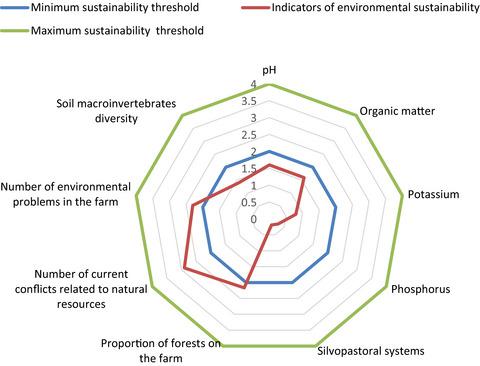当前位置:
X-MOL 学术
›
Food Energy Secur.
›
论文详情
Our official English website, www.x-mol.net, welcomes your
feedback! (Note: you will need to create a separate account there.)
Measuring sustainability of smallholder livestock farming in Yurimaguas, Peruvian Amazon
Food and Energy Security ( IF 4.0 ) Pub Date : 2020-09-01 , DOI: 10.1002/fes3.242 Mariella Van‐Heurck 1 , Julio Alegre 2 , Reynaldo Solis 3 , Dennis Del Castillo 3 , Lisset Pérez 4 , Patrick Lavelle 4 , Marcela Quintero 4
Food and Energy Security ( IF 4.0 ) Pub Date : 2020-09-01 , DOI: 10.1002/fes3.242 Mariella Van‐Heurck 1 , Julio Alegre 2 , Reynaldo Solis 3 , Dennis Del Castillo 3 , Lisset Pérez 4 , Patrick Lavelle 4 , Marcela Quintero 4
Affiliation

|
Sustainability measurement addresses the social, economic, and environmental aspects in order to support policy and decision‐making. In the Peruvian Amazon, some smallholder livestock farmers have subsisted through time, partially preserving the ecosystems and demonstrating in practice a certain degree of sustainability. In this regard, this study aims at measuring the sustainability of smallholder livestock farming in the Peruvian Amazon. Sustainability was measured using a multi‐criteria method, through the construction of sustainability indicators based on information obtained from field surveys, and soil and macrofauna sampling in the pastures. For this purpose, economic, environmental, and socio‐cultural indicators were considered, with a rating scale from 0 to 4, where 0 is the least sustainable category and 4 is the most sustainable one. Smallholder livestock farming was considered sustainable if the general sustainability index (GenSI) was equal to or greater than 2 and, at the same time, if none of the three indicators had a value lower than 2. The socio‐cultural indicator was within the sustainability threshold, but the economic and environmental indicators did not fulfill the necessary requirements to consider smallholder livestock farming a sustainable activity in the city of Yurimaguas, Peru. The critical points affecting the sustainability of smallholder livestock farming in Yurimaguas were as follows: degraded soils, lack of silvopastoral systems, inefficient transport system, low annual income, and low levels of associativity. The results suggest the need for mitigating these limitations, as well as promoting associativity and implementing silvopastoral systems for the improvement of the welfare of smallholder livestock farmers.
中文翻译:

评估秘鲁亚马逊尤里马瓜斯小农畜牧业的可持续性
可持续性衡量涉及社会,经济和环境方面,以支持政策和决策。在秘鲁的亚马逊河,一些小农户的牲畜一直生活在一段时间内,部分保护了生态系统,并在实践中证明了一定程度的可持续性。在这方面,本研究旨在衡量秘鲁亚马逊河小农畜牧业的可持续性。通过基于野外调查获得的信息以及牧场中土壤和大型动物抽样的信息,通过构建可持续性指标,使用多准则方法来衡量可持续性。为此,考虑了经济,环境和社会文化指标,其评级范围为0到4,其中0是可持续性最差的类别,4是最可持续性的类别。如果总体可持续性指数(GenSI)等于或大于2,并且同时三个指标均没有低于2,则认为小农畜牧业是可持续的。社会文化指标在可持续性之内阈值,但经济和环境指标未达到将小农户畜牧业视为秘鲁尤里马瓜斯市可持续活动的必要要求。影响Yurimaguas小农畜牧业可持续性的关键点如下:土壤退化,林牧系统缺乏,运输系统效率低下,年收入低以及联系度低。结果表明有必要减轻这些限制,
更新日期:2020-09-01
中文翻译:

评估秘鲁亚马逊尤里马瓜斯小农畜牧业的可持续性
可持续性衡量涉及社会,经济和环境方面,以支持政策和决策。在秘鲁的亚马逊河,一些小农户的牲畜一直生活在一段时间内,部分保护了生态系统,并在实践中证明了一定程度的可持续性。在这方面,本研究旨在衡量秘鲁亚马逊河小农畜牧业的可持续性。通过基于野外调查获得的信息以及牧场中土壤和大型动物抽样的信息,通过构建可持续性指标,使用多准则方法来衡量可持续性。为此,考虑了经济,环境和社会文化指标,其评级范围为0到4,其中0是可持续性最差的类别,4是最可持续性的类别。如果总体可持续性指数(GenSI)等于或大于2,并且同时三个指标均没有低于2,则认为小农畜牧业是可持续的。社会文化指标在可持续性之内阈值,但经济和环境指标未达到将小农户畜牧业视为秘鲁尤里马瓜斯市可持续活动的必要要求。影响Yurimaguas小农畜牧业可持续性的关键点如下:土壤退化,林牧系统缺乏,运输系统效率低下,年收入低以及联系度低。结果表明有必要减轻这些限制,











































 京公网安备 11010802027423号
京公网安备 11010802027423号